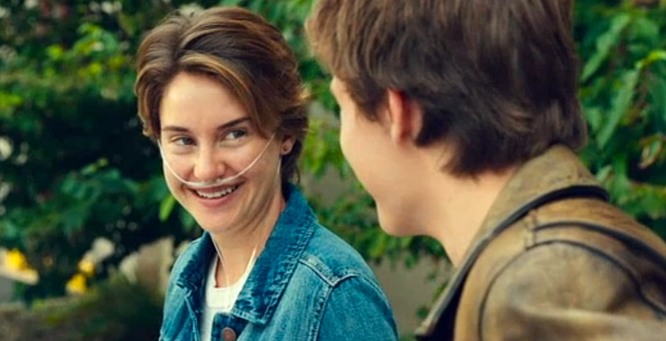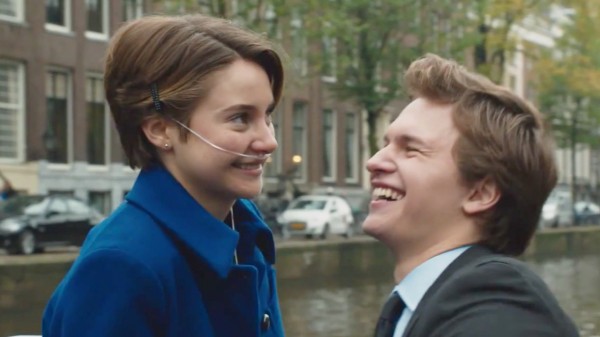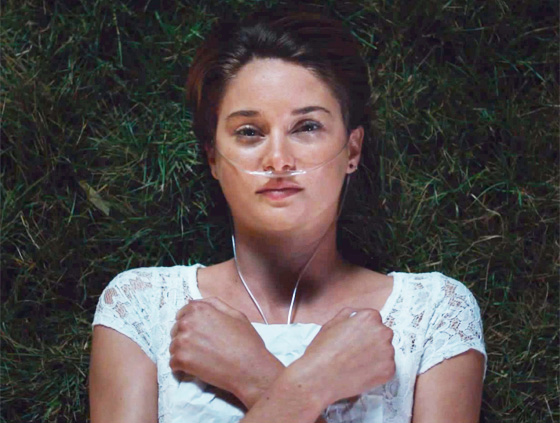 The Fault in Our Stars works excellently as a teen love tearjerker, but good acting, a lively script, and great source material elevate it to a story about the risk of loving at any time and at any age.
The Fault in Our Stars works excellently as a teen love tearjerker, but good acting, a lively script, and great source material elevate it to a story about the risk of loving at any time and at any age.
Shailene Woodley, an excellent rising young actress, plays Hazel Grace. At sixteen, Hazel has spent years in and out of hospitals fighting cancer. She carries an oxygen tank with her wherever she goes.
At sixteen, Hazel is smart enough to know that her days are numbered, that she’s living on borrowed time already, and that life has been terribly, terribly unfair to her.
To her credit, Hazel wants to live out her time honestly, looking death in the face front on, and to minimize the pain of her inevitable departure for those who love her.
She attends a support group, although she sees no point in it, to help her parents (Laura Dern and Sam Trammell) feel like she is doing something, anything, to take care of herself emotionally.
There she meets Augustus (Ansel Elgort – now the next teen heartthrob), a cancer survivor who lost a leg to his disease.
The rest of the movie is their love story.
Gus is optimistic to Hazel’s realism. He is cheerful where she is stoic. He isn’t as well-read or bookishly philosophical as she is, but he senses joy and hope deep inside. He’s a good friend and a good person.
Most of all, Gus is not afraid. The death sentence hanging over Hazel’s head doesn’t matter enough to him to scare him away.
The movie succeeds beyond a teenybopper demographic because all the characters are so richly drawn. You can’t help but root for Hazel, can’t help but admire her clear-eyed perspective and yet see how it holds her back. You can’t help but love Gus, smile at his energy, shake your head at his persistence, weep when he falters.
Dern and Trammell breathe life into the role of parents, the common awkwardness of having a teenager heightened and also diminished by their desperate fear of losing her. Even secondary characters are living, breathing people: Teen friend Isaac (Nat Wolff) who loses his eyes to cancer; the religious man who leads the support group and who almost, but not quite a caricature.; even Hazel’s hero, an author named Van Houton (Willem Dafoe) has depth and nuance to his despair.
The love is also richly drawn. The two get to know each other slowly, have moments of ups and downs, grow in understanding and trust and affection for each other before they move into a romantic relationship. The viewer can see why she loves him and why he loves her.
The Fault in Our Stars has moments of dark humor, but it is a deeply serious movie. It’s the type of movie that has a key romantic moment not in a park or field of flowers, but Holocaust memorial site. The lovers never forget death hovers over them and the audience is not allowed to forget it either.
It’s also desperately sad, deeply deeply sad. It’s hard for even the most stoic viewer to keep a dry eye. I suspect there will be one or two moviegoers in every theater who will sob uncontrollably, as a few did in the screening I attended. This is a story of loss, of life that is not fair, of a fate everyone would give anything to avoid, but are ultimately powerless to ward off.
But it is not merely that.
As Hazel and Gus dare to love each other with the future so uncertain, the story broadens. Their courage as teenagers echoes the courage we all face when we dare to truly love someone. We’re all under the threat of death, whether it comes at 18 or 88. There is loss coming for each of us who dares to love.
The beauty and truth of Hazel and Gus’s story is that it’s worth it. Love is worth it.
That is a message we need now more than ever. I believe our young people give up on marriage and drift from one romance to the next not because they are too passionate, but because they don’t believe in love enough.
As one character says in the movie, it’s a privilege to love, to truly love, someone.
The Fault in Our Stars is rated PG-13 for thematic material, some crude language, and sexuality. Parents should know that Hazel and Gus eventually enter into a sexual relationship. Unlike so many depictions of sex, their relationship is based on deep emotional intimacy and trust before it becomes physical. It is not graphically shown.














